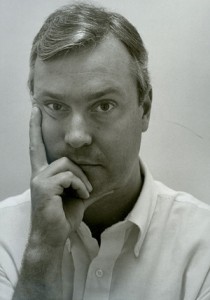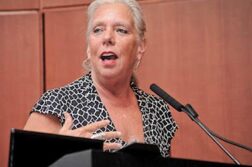JOHN MITZEL, the proprietor of Calamus Bookstore—Boston’s GLBT bookstore—died on October 4 in his home in Arlington, Massachusetts. His death was the result of a long series of physical ailments, some related to alcohol and most recently a battle with oral cancer. Mitzel—as he was publicly known to everyone, though some friends, myself included, called him John—was, for over four decades, a central figure in Boston’s queer community. I have such a long history with John, it is almost impossible to detail everything he meant to me, or what he did for the LGBT community in Boston.
 John and I met in 1971, soon after I arrived in Cambridge, at a Fag Rag meeting. Fag Rag, the first national gay male periodical, had started the year before. It was published by an anarchist collective and connected to Gay Men’s Liberation, Boston’s GLF. Coming from gay liberation circles in New York, I immediately joined GML. By 1973, John and I were fast friends and probably spoke on the phone almost every day since then.
John and I met in 1971, soon after I arrived in Cambridge, at a Fag Rag meeting. Fag Rag, the first national gay male periodical, had started the year before. It was published by an anarchist collective and connected to Gay Men’s Liberation, Boston’s GLF. Coming from gay liberation circles in New York, I immediately joined GML. By 1973, John and I were fast friends and probably spoke on the phone almost every day since then.
John, born in 1948, was a private person. As compulsively gregarious as he was, he almost never spoke about his inner life. He’d been institutionalized, was rumored to have received shock treatments in his teens for being gay. He seemed to be completely estranged from his biological family, though this changed later in life when he become close to his parents and his brother David. And he drank. I suspect he drank—seriously drank—most every day of his adut life.
I probably knew John as well as anyone. And to me much of his inner life remains something of a mystery. I have no clear idea of his romantic passions, or even really of his sex life, although clearly his passion for wearing uniforms—police uniforms for special occasions, often security guard uniforms as everyday work wear—was a hint of his erotic fantasy life. Coming of age in a movement predicated on the insistence that the “personal is the political,” John remained resolutely private.
John was passionate about two things: community and writing. He was actively, and continuously, involved in its creation, as writer, organizer, speaker—often as gadfly. He was a founding member of the Fag Rag collective in 1971. He helped found the Good Gay Poets collective in 1973, even though he professed to hate poetry. (As usual, his perversity emerged, as he secretly wrote it and published his collected poetry last year.) He was a founding member of The Boston Gay Review, a gay male literary journal, in 1976. He wrote numerous articles for Boston’s Gay Community News and had a column in Philadelphia Gay News in the 1970s and ’80s. For nearly twenty years he wrote a monthly column, “Common Sense,” for The Guide, a Boston-based gay travel and political magazine. As a publisher, he started Manifest Destiny Press in the 1970s and Calamus Books, a press that emerged from the bookstore in 2002.
John’s essays and columns, often iconoclastic and cranky, were very important for mapping out new ways of thinking. He emulated H. L. Menken, but with a queer sensibility. He was, in many ways, an editorialist of the first rank. But John never became the famous fiction writer he wanted to be (who does?). He wanted to be Gore Vidal—urbane, original, on point, always on target. His self-published novels Inferno Heights and Doubly Crost (both 2009) are frenzied, metaphysical, hallucinogenic gay fantasias on politics and life that feel stuck in the satiric traditions of James Campbell and Carl Van Vechten. John’s encyclopedic knowledge of American literature was amazing, but he was often tripped up by imitation. On the other hand, his short stories—collected in “Some Short Stories about Nasty People I Don’t Like” (1977) and “Last Gleamings” (2013) are deft and smart. “How to Write a Short Story” is as good as anything Dorothy Parker ever wrote.
John’s genius was in creating spaces for people to come together. The salon is a European notion, but John was a master at creating these in the Boston queer community. When John was the cashier at Boston’s South Station Cinema—Boston’s first gay porn theater—its office and lobby became the public meeting place of writers, artists, and assorted intellectuals, all mingling art and politics with the occasional dip into the theater’s back rooms for sex. In the 1980s, when John managed Glad Day Bookshop, first on Winter Street and then Boylston Street, he recreated this same setting (alas, without the back room). In 2000, after Glad Day closed, he opened Calamus Bookstore—truly his own space—an environment that fostered a vibrant community of gay intellectuals.
Michael Bronski’s latest book is “You Can Tell Just By Looking”: And 20 Other Myths about LGBT Life and People. The above was excerpted from a piece that appeared in Gay City News. (The full text can be found at: http://gaycitynews.com/john-mitzel-remembrance/)




